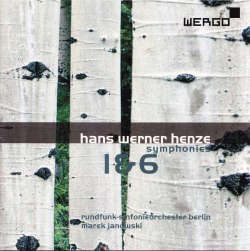| 
|
Hans Werner HENZE (1926-2012)
Sinfonie für Kammerorchester (1946/47, rev. 1963, 1991) [20:49]
Sinfonia N. 6 für zwei Orchester (1969, rev. 1994) [40:16]
Rundfunk-Sinfonieorchester Berlin/Marek Janowski
rec. 28-29 August 2012 (Sinfonie für Kammerorchester); 8-9, 11 June 2012 (Sinfonia No. 6) Rundfunk, Berlin-Brandenburg, Haus des Rundfunks, Sendesaal 1, Germany
WERGO WER67242  [61:17] [61:17]
This release follows three other volumes of Hans Werner Henze’s
symphonies from Wergo, with Nos. 3, 5, 7, 8 and 9 already released
at time of writing. This particular CD has been reviewed
fulsomely by Michael Cookson.
My reference for Henze’s symphonies is likely to be the same
as everyone else’s, for some time one of the only few sources
from Deutsche Grammophon - reviewed
elsewhere on these pages in its reincarnation on Brilliant Classics.
Simon Rattle’s EMI recordings are also worth looking out for
(see review).
The DG London Symphony Orchestra recording of the Sixth Symphony
conducted by the composer is a classic, and is a monumental event
in its own right. The recording catches Henze’s details of orchestration
to startling effect, complete with amplified banjo and wobble-boards,
dramatic shifts of perspective through manipulation via loudspeakers,
and an often uncompromisingly violent expressive/expressionistic pallet.
This is strikingly modernistic stuff, but you always sense the firm
hand of control of a master behind the representations of chaos and
disturbance.
This Wergo release needs to challenge its DG ancestor in as many of
these respects as possible, and we do get close. This recording is
also highly detailed, the acoustic smaller and the perspective not
quite as grand in scale and with reduced spotlighting of the less
familiar instruments. This provides a more natural, concert-hall impression,
but loses something of the theatricality of Henze’s own conducted
version, for all its artifice of balance and heightening of effects.
The tough uncompromising nature of the music shines through in this
case through the quality of the playing, and you sense an orchestra
entirely at ease with this idiom - indeed, each section relishing
and laying into their realms of extreme performing whether wildly
splashing around or subtly contributing little brushstrokes of momentary
expressiveness. The brass group stands out, as they always will, but
they always come up with the goods and maintain acute accuracy and
discipline. Each woodwind glissando and plucked string is placed with
conviction and accuracy, and if the levels of visceral excitement
are less extreme as with the DG original this Berlin Radio version
creates a new and extremely potent reference.
Henze described the original version of his 1. Sinfonie as
filled with “weaknesses and inadequacies … an ill-conceived,
frivolous and infantile composition”. The revised version is
one in which “everything is new, different and better”.
As an earlier work there are still influences which touch on Stravinsky
and others, but the virtuoso sweep of Henze’s musical canvas
demonstrates a voice already well on its way to greatness. Marek Janowski’s
tempo in the opening movement is surprisingly slow, timed at eight
minutes to Henze’s 5:50. We are talking about a performance
with revisions made in 1991, and a comparison between this and the
1963 version of the score would in all likelihood reveal reasons for
these changes. The playing is better and the ensemble cleaner in this
new recording, but the energy of the original is however substituted
for something with an almost Brucknerian stateliness by comparison.
Janowski’s timings are broader in general, but it is in the
opening movement that the transformation is most apparent. The final
allegro con moto is also less urgent sounding and this version
shaves off about half a minute compared to the DG recording; in a
movement of between five and six minutes is not insignificant. The
contrast here is more one of mood where Janowski is more eloquent
and poetic, deepening the expression but missing out a little on spots
where Henze conjures an almost jazzy feel.
Composers are not always the perfect conductors of their own music,
and the refinement of performance on this Wergo recording is superb.
I would also be the last to want carbon-copy performances of previous
examples, and Jankowski’s powerful interpretations can very
easily stand in their own right. For true aficionados of Henze’s
music the composer’s classic recordings on DG will however remain
a significant source, and this Wergo release, while raising the standards
in terms of performance, won’t kick those originals into redundancy.
Dominy Clements
Previous review: Michael
Cookson
 |
 |
|



 All Nimbus reviews
All Nimbus reviews








